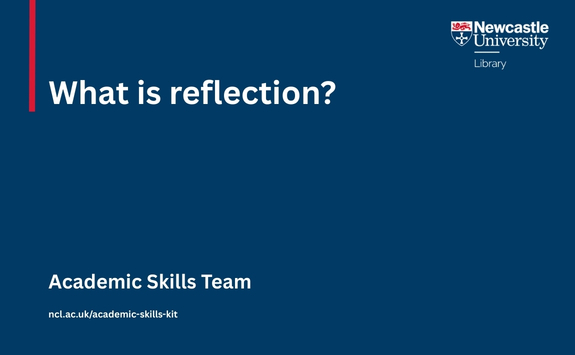Reflective Practice
Build a habit of reflecting on your practice to help you develop as a learner.
What is reflection?
Reflection is an important part of the learning process as it encourages us to think about our current approaches and to what extent they fit the present circumstances. More formalised, systematic, reflective practice has been used historically in disciplines such as teaching and clinical practice to encourage practitioners to learn from their professional experiences. For instance, educationalists may reflect on the effectiveness of a different form of assessment or method of teaching. Likewise, health care professionals may reflect on the strengths and limitations of interventions in the care of patients.
Questions to help you explore your approach to learning
Reflecting on your current practices might help you to identify tools/approaches and techniques to continue to use, ways of adapting these tools/approaches and techniques, or consider different ways of studying.
Drawing on a range of reflective frameworks (see Williams, Woolliams & Spiro, 2012), the following questions are intended to guide thinking about what is working for you, what isn't and what adaptations or changes could be tried as we make efforts to keep learning.
What do you do?
A useful first step to reflection can be to focus on an aspect of your study practice which you want to consider in more detail. Think about the approaches you are using to:
- Read sources and record notes from this reading
- Plan the structure of an assignment
- Make use of notes to construct an assignment
- Edit an assignment for structure and coherence, analysis and critical evaluation
- Revise and prepare for exams
Would you typically use these practices when you are studying? What is it, more specifically, that's informed your decision to work/study in this way?
Reflection
Once you have identified the focal practice(s) of this reflection, the next stage is to analyse what is working well, or not, and why.
- What do you think has worked well about the tools/techniques/approaches you are using?
- How do you know it has worked well?
- What have you been able to do, progress with or achieve?
Note that progress and achievement is not about focussing solely on the end task of 'finishing an assignment', but also how you are making progress via a range of different tasks, at different stages, for instance having found a relevant article to read or aligned in-text references with the reference list of an assignment in progress.
- What hasn't worked so well?
- Why has this tool/technique/approach not 'worked'?
- In what ways hasn't it worked?
- How might you respond to this?
- Are there further adaptations which could be made to alter the use of this tool/technique/approach to better fit the situation?
It's likely that there'll be approaches which do not work for us for a range of reasons. Rather than feeling as though this is something we aren't 'doing right', this is where reflection can help us to consider what is/isn't working and how we might adapt our approach or thinking to the situation. It may be that the current situation is providing barriers that require some negotiation, or thinking about.
Evaluation
Drawing on the analytical thinking undertaken, the next stage of reflection is to evaluate what this thinking means for your learning. For instance, what are you learning about yourself and/or your study practices?
- Is this learning concerned with your thinking about change, the use of technology in your learning, the use of a blend of technology and pen and paper to record and organise your notes and thinking about an assignment, for instance, or even a combination of these aspects?
Learning is different for each of us so these questions are likely to uncover unique reflections for each individual.
Action planning
The final stage of reflection is to consider what you aim to put into practice, adapt, use or not use based on your thinking about these reflective questions
- Will you continue with the use of current tools/techniques/approaches to studying?
- Will you change something about your current approach? Why? What will this change, or adaptation be?
- Will you try something different in light of your responses to these reflective questions?
Some of the prominent reflective frameworks are represented as cycles, conveying the continuity of reflective thinking and learning. Therefore, the action plans may then become the aspects on which we reflect next.
Reflective practice
Reflective thinking is a process concerned with encouraging individuals to take time to think about their current practices. This process of reflective practice might be helpful as you pause to think about what study practices you draw on, and why, and which practices require adaptation.

